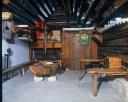It’s not a rocky peak in Switzerland, Italy, or France, or so I learn from a 1908 volume called Peep at Many Lands: Switzerland by John Finnemore (London: Adam and Charles Black). It’s one of those lovely old books, embossed red cloth cover with no picture, kept in the storage at Dayton Metro Library. The book that is, not the alp.
No, an alp, in 1908 at least, is a meadow on the way up to those rocky peaks. The peak is above the treeline, the alp below. The livestock of Switzerland graze on the lush grass that springs up along with a kaleidoscope of wild flowers after snow melt. In times past–the time of the book’s writing–there was great celebration in the villages on the day the livestock, cattle, sheep, and goats, would leave the lowland barns behind, flowers woven into their horns, to begin the two-day climb to the alp for their summer’s stay. The owners and their sons stayed in rude chalets on the mountains all summer long to tend the flocks. Where cattle were grazing, the men set up cheese-making dairies. Alpine Swiss cheese is not a standardized product, but one that takes on the flavor of the particular herd in a particular alp’s dairy.
What about storms? The shepherds gather the flock into circles where they stand with heads down to weather what comes, including thunder, lightning and hail.
Does this still happen? I’ll be there in September, to find out. Meanwhile, there’s the internet. Why is it relevant? Because Einstein and his mother and aunts and cousins vacationed for a month each summer in the Swiss Alps. It’s best I know what I’m talking about–in the parlance of the day.




